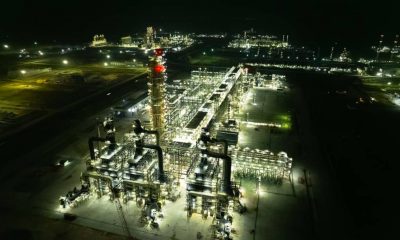Cover
The Dangote Refinery: Vision, Challenges, and the Road Ahead

Agnes Ekebuike
In an ambitious move that highlights Nigeria’s potential for economic self-reliance, the Dangote Group embarked on constructing the world’s largest single-train refinery. The $14 billion investment by Aliko Dangote was envisioned to revolutionize Nigeria’s oil and gas sector, addressing the country’s persistent refining deficits. However, the journey has not been without significant difficulty and criticisms, raising questions about the strategic decisions underlying this colossal project.
A Grand Vision
Aliko Dangote, Africa’s wealthiest man, initiated the refinery project with a clear objective: to reduce Nigeria’s dependence on imported refined petroleum products. By refining crude oil domestically, the Dangote Refinery aims to enhance energy security, create jobs, and spur economic growth. The refinery, with a capacity to process 650,000 barrels per day (bpd), is set to be the largest in Africa and among the largest in the world.
Strategic Missteps
Critics argue that Dangote’s decision to build the refinery without securing an exploration license for crude oil production may have been a strategic misstep. At the project’s inception, Nigeria’s total crude output was below 2 million barrels per day, with much of it committed to existing contracts and swaps with foreign refineries. This left the Dangote Refinery dependent on imported crude, primarily from the United States, which nullifies some of the logistical and cost-saving advantages of domestic refining.
Critics have it that if he had started drilling when he began building the refinery, he would now be producing enough to feed his refinery. This perspective suggests that an integrated approach—combining production and refining—might have mitigated supply chain risks and ensured a more stable feedstock for the refinery.
Economic and Policy Implications
The Dangote Refinery’s reliance on imported crude has broader implications for Nigeria’s economy and policy landscape. While local refining theoretically reduces transportation costs and increases local employment, the benefits are diluted if crude must be sourced internationally. Furthermore, the project’s viability is tied to Nigeria’s policy environment, which has historically lacked consistency in supporting domestic production and refining initiatives.
One significant policy issue is Nigeria’s allocation of crude oil for local refining. Unlike other oil-producing nations where refineries often operate independently of domestic crude production, Nigeria’s policy framework has not consistently supported such a model. “Not all refiners in other climes own oil mining licenses (OMLs). It is Nigeria, as a policy, that ought to dedicate some percentage of its daily production to local feed,” emphasized an industry expert.
Financial and Environmental Concerns
The financial aspects of the project have also drawn scrutiny. The Nigerian National Petroleum Corporation (NNPC) invested $2 billion in the refinery, a decision questioned by many given the uncertainties surrounding crude supply and the refinery’s repeated delays. “Why did NNPC put our money in a refinery where they can’t guarantee crude supply?” is a sentiment echoed by several analysts.
Additionally, the environmental impact of the refinery cannot be overlooked. Concerns about pollution and the sustainability of such a massive industrial complex in Nigeria’s economic landscape are significant, especially as global trends move towards greener energy solutions.
The Long Game
Despite these challenges, some industry observers believe that Dangote’s long-term strategy may still yield significant benefits. “Dangote plays the long game—he is waiting for Nigeria in the future. Ultimately, he will have the upper hand in an integrated value chain business.” The refinery could eventually displace European refiners from the Nigerian market and secure a substantial share of the African market if supply chain risks are managed effectively.
Moreover, the refinery’s potential to produce Premium Motor Spirit (PMS) and other refined products domestically could transform Nigeria’s energy landscape. The strategic investment, if managed well, might offer dividends similar to those from the Nigeria LNG investment, which has consistently provided returns despite initial skepticism.
Conclusion
The Dangote Refinery stands as a testament to Nigeria’s industrial ambitions and the complex interplay of business strategy, economic policy, and national interest. While the project faces significant hurdles, its success or failure will provide critical lessons for future investments in Nigeria’s oil and gas sector. As the refinery approaches operational status, the focus will inevitably shift to how effectively it can navigate the challenges of crude supply, financial viability, and environmental sustainability, and deliver on its promise of transforming Nigeria’s energy sector.




















